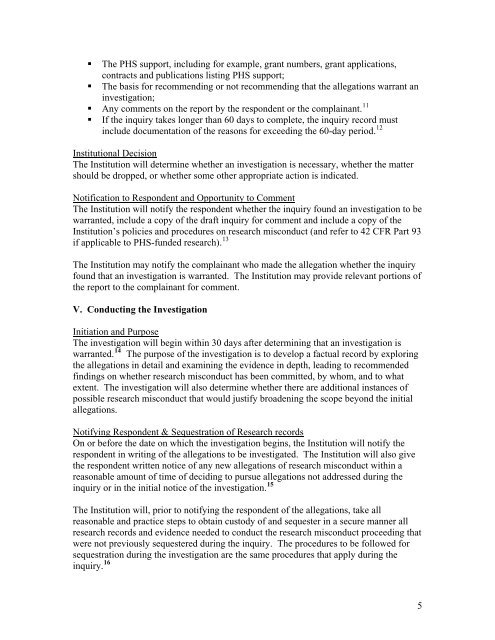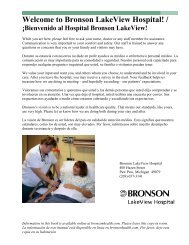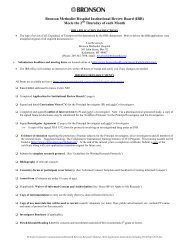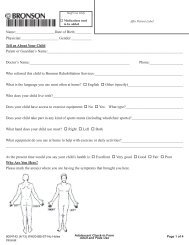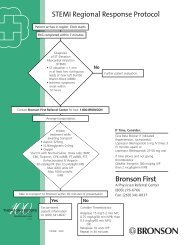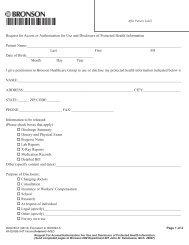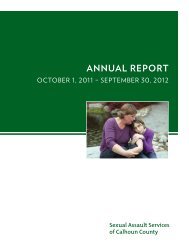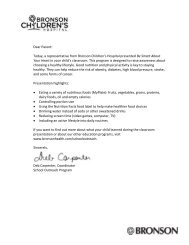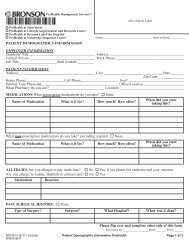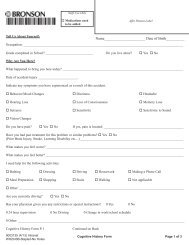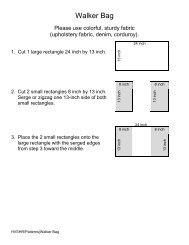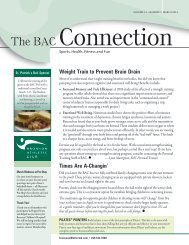IRB Responding to Allegation of Research Misconduct Policy
IRB Responding to Allegation of Research Misconduct Policy
IRB Responding to Allegation of Research Misconduct Policy
You also want an ePaper? Increase the reach of your titles
YUMPU automatically turns print PDFs into web optimized ePapers that Google loves.
• The PHS support, including for example, grant numbers, grant applications,<br />
contracts and publications listing PHS support;<br />
• The basis for recommending or not recommending that the allegations warrant an<br />
investigation;<br />
• Any comments on the report by the respondent or the complainant. 11<br />
• If the inquiry takes longer than 60 days <strong>to</strong> complete, the inquiry record must<br />
include documentation <strong>of</strong> the reasons for exceeding the 60-day period. 12<br />
Institutional Decision<br />
The Institution will determine whether an investigation is necessary, whether the matter<br />
should be dropped, or whether some other appropriate action is indicated.<br />
Notification <strong>to</strong> Respondent and Opportunity <strong>to</strong> Comment<br />
The Institution will notify the respondent whether the inquiry found an investigation <strong>to</strong> be<br />
warranted, include a copy <strong>of</strong> the draft inquiry for comment and include a copy <strong>of</strong> the<br />
Institution’s policies and procedures on research misconduct (and refer <strong>to</strong> 42 CFR Part 93<br />
if applicable <strong>to</strong> PHS-funded research). 13<br />
The Institution may notify the complainant who made the allegation whether the inquiry<br />
found that an investigation is warranted. The Institution may provide relevant portions <strong>of</strong><br />
the report <strong>to</strong> the complainant for comment.<br />
V. Conducting the Investigation<br />
Initiation and Purpose<br />
The investigation will begin within 30 days after determining that an investigation is<br />
warranted. 14 The purpose <strong>of</strong> the investigation is <strong>to</strong> develop a factual record by exploring<br />
the allegations in detail and examining the evidence in depth, leading <strong>to</strong> recommended<br />
findings on whether research misconduct has been committed, by whom, and <strong>to</strong> what<br />
extent. The investigation will also determine whether there are additional instances <strong>of</strong><br />
possible research misconduct that would justify broadening the scope beyond the initial<br />
allegations.<br />
Notifying Respondent & Sequestration <strong>of</strong> <strong>Research</strong> records<br />
On or before the date on which the investigation begins, the Institution will notify the<br />
respondent in writing <strong>of</strong> the allegations <strong>to</strong> be investigated. The Institution will also give<br />
the respondent written notice <strong>of</strong> any new allegations <strong>of</strong> research misconduct within a<br />
reasonable amount <strong>of</strong> time <strong>of</strong> deciding <strong>to</strong> pursue allegations not addressed during the<br />
inquiry or in the initial notice <strong>of</strong> the investigation. 15<br />
The Institution will, prior <strong>to</strong> notifying the respondent <strong>of</strong> the allegations, take all<br />
reasonable and practice steps <strong>to</strong> obtain cus<strong>to</strong>dy <strong>of</strong> and sequester in a secure manner all<br />
research records and evidence needed <strong>to</strong> conduct the research misconduct proceeding that<br />
were not previously sequestered during the inquiry. The procedures <strong>to</strong> be followed for<br />
sequestration during the investigation are the same procedures that apply during the<br />
inquiry. 16 5


